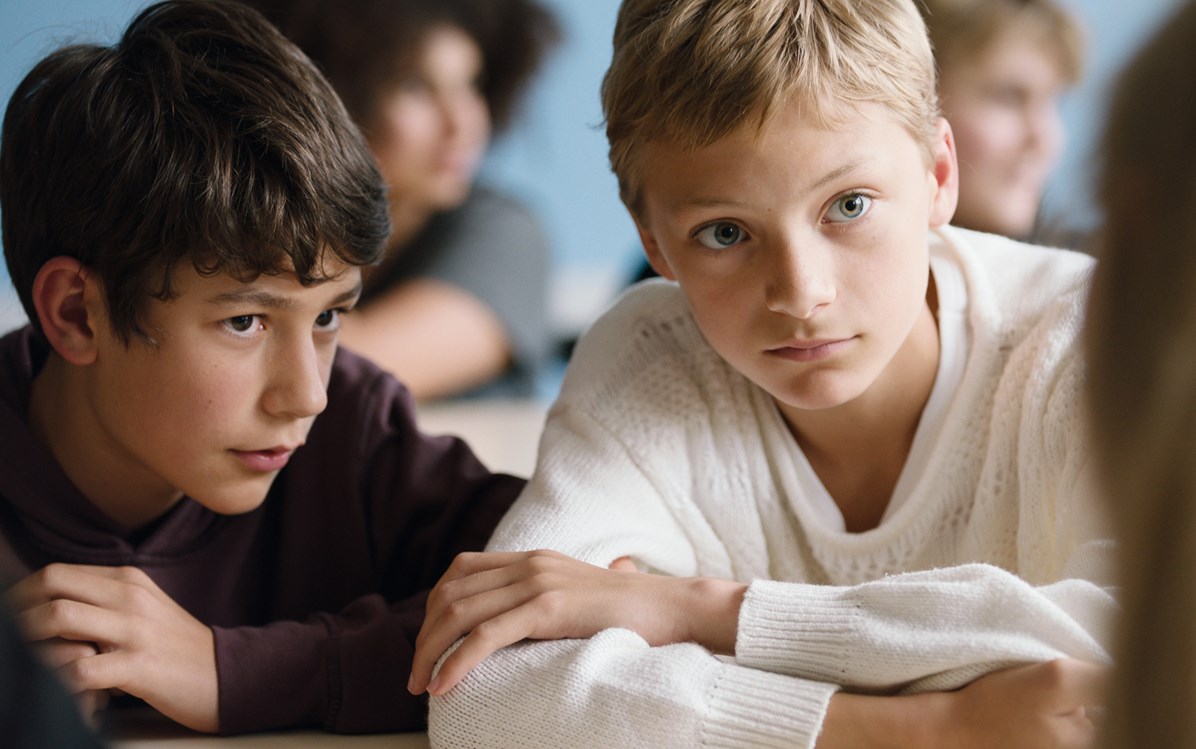Lukas Dhont’s second feature Close has been shortlisted as a Best International Film competitor at the 2023 Academy Awards. It was also in competition for the Palme d’Or at Cannes. It is a vast improvement over Girl which was rightly lambasted for its portrait of trans youth. In Close, Dhont continues his themes of the traps that heteronormativity create for the young, but in this instance his view is more empathetic than potentially exploitative.
Léo (Eden Dambrine) and Rémi (Gustave De Waele) are boys on the cusp of adolescence. Living in an Eden like part of Belgium which is made more ideal by the profession of Léo’s family as flower farmers, the pair have a seemingly unbreakable bond. They play together creating imaginative games, they sleep over at each other’s houses in the same bed, they make plans for a future where each will support the other’s dreams. They are close and nobody questions the innocent and joyful nature of their relationship until the pair land in high school where they experience the sting of schoolyard bullying and questions about their sexuality.
Léo becomes clued into the undercurrents of what is expected of him in terms of masculinity. When he is questioned (perhaps innocently, perhaps not) about whether he and Rémi are a couple he bristles and replies that they are not. They are like brothers. He also notes that if they were girls no-one would question the affection they have for each other, and indeed this is a poignant observation about the nature of gendered friendship.
Léo begins to pull away from Rémi which leaves Rémi in a state of confusion. What has changed? Why has it changed? How can a friendship that defined their youth suddenly be over? Both boys feel pain at the separation, but Léo knows that if he is to survive high school he will sacrifice a person he loves. What he doesn’t realise is that the sacrifice will lead to a permanent estrangement that will never be healed.
Dhont and co-screenwriter Angelo Tijjsens focus on Léo, and by necessity, the film rests mostly in his POV. He knows the damage he is doing to himself and to Rémi and puts himself through punishing rituals to prove his masculinity, such as joining the local ice hockey team where he throws himself into walls in a manner that implies self-destruction. In his ice hockey uniform he becomes indistinguishable from the other boys. He is padded up and masked. Dhont questions if Léo is actually becoming himself by conforming (and in turn bullying others) or is he putting on armour to protect himself. It contrasts starkly with the earlier parts of the film where Léo runs free wearing a simple white singlet through fields of flowers.
Grief is a key aspect to Dhont’s work as well as overwhelming feelings of shame. Without going into spoilers Close is a tragedy and one that never allows Léo adequate closure, just feelings of desolation and loss. Paradise is never regained, and perhaps that is something that just happens when one grows up and conforms to social pressure, or perhaps there is something sinister in that forced conformity.
Dhont directs in a manner that echoes the title of the film. The film is shot by cinematographer Frank van den Eeden in deliberate close-ups. The only time the camera pans out is when Léo and Rémi are in the school yard for their first day of high school and the audience is given the sense that they are in a new world, on that is grey and harsh.
Eden Dambrine gives a remarkable performance as Léo. His pain is palpable and the struggle to control his emotions during the worst moments of his young life are conveyed with honesty. The supporting cast including Émile Dequenne as Sophie, Rémi’s mother and Igor van Dessel as Charlie, Léo’s brother are excellent, as is the performance of Gustave De Waele as the bruised and bewildered Rémi.
Dhont condemns the forced conformity that still defines masculinity. Even in a liberal country like Belgium the idea that manhood is predicated on a set of acceptable gender traits that are pushed onto children at puberty is dangerous to the well-being of young minds who repeat the lessons that their parents taught them. It is interesting to note that neither Léo nor Rémi’s parents chose to perpetuate the stereotypes that damage the boys once they reach high school.
Close loses some of its power in the third act, but the sustained vision Dhont crafts of the cost that young people pay for social inclusion never wanes. Close is indeed heartbreaking and the pervasive sentiment of loss is keenly observed. Laura Wandel’s magnificent 2021 film Playground (Un Monde) also used the idea that children exist on a different level in the school yard, a world in itself, to the one they authentically want to belong to, and are unable to communicate to adults what bullying is truly costing them. Léo and Rémi articulate that cost through different means, but ultimately the price they both pay is enormous and sadly all too common.
Director: Lukas Dhont
Cast: Eden Dambrine, Gustav De Waele, Émilie Dequenne
Writers: Lukas Dhont, Angelo Tijssens



